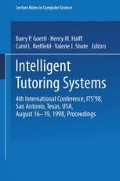Abstract
Re-using pre-existing electronic information has become a new perspective able to reduce the development costs of intelligent learning environments (ILE). This approach has to face the problem of organizing and structuring this pre-existing information in a way that ease users’ understanding and assimilation. The automation of the Formal Concept Analysis (FCA) theory is proposed as a way to structure conceptually the reused information and as a suitable method to implement different interaction techniques. Therefore, the FCA can be a relevant and competitive method for the production of ILEs, and specifically in the construction of intelligent assistants.
Access this chapter
Tax calculation will be finalised at checkout
Purchases are for personal use only
Preview
Unable to display preview. Download preview PDF.
References
Architectures and Methods for Cost-Effective and Reusable ITS: An Electronic Community, 1998. [WWW document, URL:http://advlearn.lrdc.pitt.edu/its-arch/]
Sokolnicki, T. “Towards knowledge-based tutors: a survey and appraisal of Intelligent Tutoring Systems”. The Knoledge Engineering Review, 6(2), 59–95, 1991.
Buenaga, M., Fernandez-Manjon, B., Fernandez-Valmayor, A. “Information Overload At The Information Age”. Adults in Innovative Learning Situations, Elsevier Science B.V., Amsterdam, pp. 17–30, 1995.
Winkels R. Explorations in Intelligent Tutoring and Help IOS Press, Amsterdam, 1992.
Fernandez-Manjon, B., Fernandez-Valmayor, A., Fernández Chamizo, C. Pragmatic User Model Implementation in an Intelligent Help System. British Journal of Educational Technology, 29(2), 113–123, 1998.
Fernandez-Manjon, B., Fernandez-Valmayor, A. Building Educational Tools based on Formal Concept Analysis. D. Dicheva, I. Stanchev (Eds.) HCI-ET, Proceedings of the IFIP WG3.3 Working Conference, Sozopol, Bulgaria, May 27–28, pp 39–48, 1997.
Wasson B and Akselsen S. An Overview of On-line Assistance: from On-line Documentation to Intelligent Help and Training. The Knowledge Engineering Review 7(4) 289–322, 1992.
Salton, G. Automatic Text Processing: The Transformation, Analysis And Retrieval Of Information By Computer, Edit. Addison Wesley, 1989.
Wille, R. Concept Lattices and Conceptual Knowledge Systems. Computers and Mathematics with Applications, 23(6–9), 493–515, 1992.
Davey, B. and Priestley, H. (1990) Introduction to Lattices and Order. Cambridge, UK: Cambridge University Press
Wolff, K. E. A First Course in Formal Concept Analysis-How to Understand Line Diagrams. Faulbaum, F. (ed.) SoftStat’93, Advances in Statistical Software 4, Gustav Fischer Verlag, 429–438, 1994.
Godin, R., Mineau, G. W., Missaoui, R. and Mili, H. Méthodes de Classification Conceptuelle Basées sur les Treillis de Galois et Applications. Revue d’Intelligence Artificielle, 9(2), 105–137, 1995.
Lindig, C. Concept-Based Component Retrieval, Proceedings of. IJCAI-95, Workshop on Formal Approaches to the Reuse of Plans, Proofs, and Programs, Montreal, 1995.
Carpineto, C., Romano, G. Automatic Construction of Navigable Concept Networks Characterizing Text Databases. M. Gori, G. Soda (Eds.) Topics in Artificial Intelligence, Lectures Notes in Artificial Intelligence 992, Springer-Verlag, Berlin, pp. 67–78, 1995.
Author information
Authors and Affiliations
Editor information
Editors and Affiliations
Rights and permissions
Copyright information
© 1998 Springer-Verlag Berlin Heidelberg
About this paper
Cite this paper
Fernandez-Manjon, B., Cigarran, J., Navarro, A., Fernandez-Valmayor, A. (1998). Using Automatic Methods for Structuring Conceptual Knowledge in Intelligent Learning Environments. In: Goettl, B.P., Halff, H.M., Redfield, C.L., Shute, V.J. (eds) Intelligent Tutoring Systems. ITS 1998. Lecture Notes in Computer Science, vol 1452. Springer, Berlin, Heidelberg. https://doi.org/10.1007/3-540-68716-5_32
Download citation
DOI: https://doi.org/10.1007/3-540-68716-5_32
Published:
Publisher Name: Springer, Berlin, Heidelberg
Print ISBN: 978-3-540-64770-6
Online ISBN: 978-3-540-68716-0
eBook Packages: Springer Book Archive

